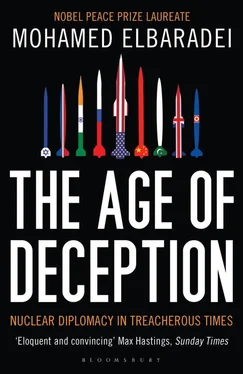As the head of the IAEA, I could not openly express my disagreement with how the issue was handled. But I didn’t need to: many critics, including some who had been silent at the time of the Iraq invasion, now spoke out. The overreaction to questionable intelligence had driven a pariah nation into still greater isolation. And that isolation had given North Korea’s generals and scientists the extra time and motivation to develop and detonate a nuclear weapon.
The bottom line was that Pyongyang now had a much stronger negotiating position than before. It was an unfortunate example of ideology and absolutism getting in the way of common sense and pragmatism.
My return visit to North Korea, in March 2007—the first in fifteen years—began with a glitch. I had passed along a request in advance, through the Chinese government, asking the North Koreans to arrange a meeting at the highest level. Stopping en route in Beijing, I was told that the North Koreans were unhappy I had not approached them directly, since they had, after all, issued the invitation for my visit. I pointed out that the IAEA no longer had an accredited North Korean ambassador, a direct channel for communication. But the thrust of their statement was clear: they did not want to be considered a satellite of China.
The only airline to fly between Beijing and Pyongyang was Air Koryo, the official North Korean carrier. I recalled my experience with Air Koryo in 1992, so we took a small private Chinese jet instead. The Pyongyang airport was deserted when we arrived. From what I could see, there was no other flight going or coming. We were the only passengers in the terminal. I was told that the entire Pyongyang traffic volume consisted of one flight to Beijing every other day.
The same Orwellian atmosphere I remembered from 1992 still pervaded the city: there were no private cars, motorcycles, or even many bicycles on the streets, only a few official vehicles. Most people we saw outside were walking. Patriotic music was piped through loudspeakers at various places in the city, including the area where we were staying.
The Hotel Koryo was deserted, except for the staff and a handful of foreigners, including an Australian delegation that was there to discuss humanitarian assistance. I was given a first-class room: a worn, drab-colored suite consisting of a bedroom and a salon. The furnishings were a hodgepodge of 1950s style. The bathroom fixtures were also old. There was no room service. The cost was roughly two hundred dollars per night.
The country’s financial situation was obviously bleak. Even as the guests of the North Korean government, we were asked to pay for everything, including the cars that took us from place to place. The food at our hotel was adequate, but the head of the Australian team said that stunted growth due to malnutrition was evident in 60 percent of North Korean children under the age of two. The Egyptian chargé d’affaires told me that even at the diplomatic quarters they had electricity and running water for only a few hours a day.
My hope for this short visit was to lay the groundwork for reestablishing North Korea’s relationship with the IAEA. I had brought a small IAEA team with me, prepared to dive into technical and policy matters if Pyongyang gave the signal. Our agenda of meetings, spanning multiple levels of the North Korean government, looked promising.
But our cool welcome was followed by a frustrating sequence of ambiguous political signals typical of Pyongyang. Our appointment with the vice minister representing North Korea at the six-party talks was canceled at the last minute. We were told he was sick, but the media widely interpreted it as an intentional slight.
Before meeting with the vice chairman of the Presidium, or Parliament, we were given a mini-tour. At the Chamber of the Deputies, we craned our necks at a fifteen-meter statue of Kim Il Sung, the “eternal” president. It reminded me of meeting the emir of Zaria, in northern Nigeria, where local people were expected to crawl on the ground to show respect. Here a godlike status was similarly conferred on a dead person. “Let’s go to the meeting,” I said, my irritation showing.
Over traditional ginseng tea, the vice chairman began by describing North Korea’s “army-centered policy,” declaring that the whole country was “of one mind.” I replied that countries and governments were ultimately judged by how much their people enjoyed the right to live in freedom and dignity. No country, I said, could afford to be isolated from the rest of the international community. The translator laughed nervously at my critical comments, leaving me unsure of whether the vice chairman received my message.
The next meeting, with the vice minister for foreign affairs, also seemed to follow a rehearsed script. North Korea, he said, had an “unpleasant history” of encountering “bias” at the IAEA. I assured the vice minister that we tried to perform our responsibilities with objectivity. After nods all around, the North Koreans said they wished to look to the future. I suggested that they consider coming back as member of the Agency. The vice minister said they first would have to see how the United States would behave, but he commended me for publicly supporting a peaceful settlement of the North Korean nuclear issue and for stressing the need to take into account the country’s security and economic concerns.
Our most pleasant interactions were with Ri Je Son, the director general of North Korea’s General Bureau of Atomic Energy, which took place at our hotel and included tasty meals: traditional Korean dishes of meat, fish, kimchee, and vegetables, coupled with wine and a traditional rice-based liqueur. With striking honesty, Ri Je Son volunteered, in response to my question, that his people could not afford to have meat every day. From a policy standpoint, however, he, too, adhered carefully to the party line—the “bad experience” with the IAEA in the past and the desire to focus on the future.
Back in my chilly suite, I realized that, despite all the posturing and the lack of a notable breakthrough, the mere resumption of dialogue would help to facilitate our interactions in the coming months. I turned on the television to the inevitable programming: more war movies featuring the atrocities perpetrated on North Korea by the United States and Japan. I was glad it was a short visit.
On March 19, 2007, Chris Hill announced that North Korea’s frozen funds in Banco Delta Asia were being “unfrozen,” in response to Pyongyang’s positive actions. The actual transfer was delayed until June, when the Russians intervened to physically move the funds from Macau to North Korea. South Korea also played its part, sending a sizable shipment of fuel oil to its northern neighbor in July. When I met that month with the South Korean president, Roh Moo Hyun, he spoke with regret about the inefficiency of the negotiations process and the time lost. “It has taken us five years,” he said, “just to convince the Americans to talk bilaterally to Pyongyang.”
The transfer of funds led to rapid progress. The North Koreans began shutting down the reactor in Yongbyon, as promised. The IAEA also responded promptly. By July 17, a team of ten Agency inspectors had verified the shutdown of all of North Korea’s designated nuclear facilities, applied IAEA seals, and begun installing surveillance equipment.
The sequence of events that followed, a period that would last through most of 2008, marked the most sustained and meaningful progress on resolving concerns related to the North Korean nuclear program since late 2000. The six-party talks continued, entering the “second phase” of actions under the Joint Agreement. Shipments of fuel oil arrived as promised. Japan and North Korea resolved to renormalize their relations. The North Koreans agreed to provide a complete and accurate declaration of their nuclear facilities and materials. The dismantling of facilities proceeded on schedule. Delegations of experts from the United States, China, and Russia were allowed to visit Yongbyon. When Chris Hill traveled to Pyongyang for further consultations, he carried with him a cordial letter from President Bush to Kim Jong Il.
Читать дальше












